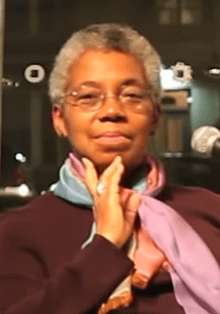Barbara J. Fields facts for kids
Quick facts for kids
Barbara J. Fields
|
|
|---|---|

Fields in 2013
|
|
| Born |
Barbara Jeanne Fields
1947 (age 78–79) |
| Alma mater | Harvard University (BA) Yale University (PhD) |
| Awards | John H. Dunning Prize (1986) Lincoln Prize (1994) |
| Scientific career | |
| Institutions | Columbia University Northwestern University University of Michigan University of Mississippi |
Barbara J. Fields is an important American historian. She was born in 1947. She teaches American history at Columbia University. Dr. Fields studies the history of the American South. She also looks at how the United States changed into a capitalist society.
Contents
About Barbara J. Fields
Barbara Fields was born in Charleston, South Carolina. She grew up in Washington, D.C. She went to Morgan Elementary School, Banneker Junior High School, and Western High School.
She earned her first degree from Harvard University in 1968. Later, she received her Ph.D. from Yale University in 1978. At Yale, she studied with C. Vann Woodward. He was a very famous American historian.
Dr. Fields has appeared in well-known TV shows. These include Ken Burns' documentary series, The Civil War and The Congress.
Her Work and Ideas
Dr. Fields was the first African American woman to become a tenured professor at Columbia University. This means she earned a permanent teaching position there. She has also taught at other universities. These include Northwestern University, the University of Michigan, and the University of Mississippi.
She is known for her essay from 1990, "Slavery, Race and Ideology in the United States of America." She also wrote a book in 2012 called Racecraft: The Soul of Inequality in American Life. She wrote this book with her sister, Karen Fields. Karen is a sociologist, someone who studies society.
In their book, they explain that "race" is not a natural thing. Instead, they argue that it was created by racism. They believe racism is a way of misunderstanding how society really works. They say that "racecraft" in America makes it hard to see the true reasons for inequality.
Awards and Recognition
Barbara Fields has received many honors for her work. In 2007, Bard College gave her an honorary doctorate. This is a special degree given to honor someone's achievements. In 2017, she received the Philolexian Award for Distinguished Literary Achievement.
Another historian, Thavolia Glymph, thinks Barbara Fields is one of the greatest historians in the United States.
Major Awards and Honors
- 1992 MacArthur Fellows Program: This award is given to talented individuals in many fields.
- 1986 John H. Dunning Prize: This prize is from the American Historical Association. She won it for her book Slavery and Freedom on the Middle Ground: Maryland during the Nineteenth Century.
- Founders Prize of the Confederate Memorial Literary Society: She won this for her book The Destruction of Slavery.
- Thomas Jefferson Prize of the Society for the History of the Federal Government: She also won this for The Destruction of Slavery.
- 1994 Lincoln Prize: This award is given by the Lincoln and Soldiers Institute. She won it for Free At Last: A Documentary History of Slavery, Emancipation, and the Civil War.
Important Books and Essays
Barbara Fields has written many important works. Here are some of them:
- "Slavery, Race and Ideology in the United States of America", New Left Review, 1990.
- "Whiteness, Racism and Identity", International Labor & Working-Class History, 2001.
- "Origins of the New South and the Negro Question", Journal of Southern History, 2001.
- "Of Rogues and Geldings", American Historical Review, 2003.
- Slavery and Freedom on the Middle Ground: Maryland during the Nineteenth Century (Yale University Press, 1985).
- The Destruction of Slavery (Cambridge University Press, 1985), with Ira Berlin, Thavolia Glymph, Joseph P. Reidy, and Leslie S. Rowland.
- Slaves No More: Three Essays on the Emancipation and the Civil War (Cambridge University Press, 1992).
- Free At Last: A Documentary History of Slavery, Emancipation, and the Civil War (The New Press, 1992).
- Racecraft: The Soul of Inequality in American Life (Verso, 2012), with Karen Fields.
 | Chris Smalls |
 | Fred Hampton |
 | Ralph Abernathy |

